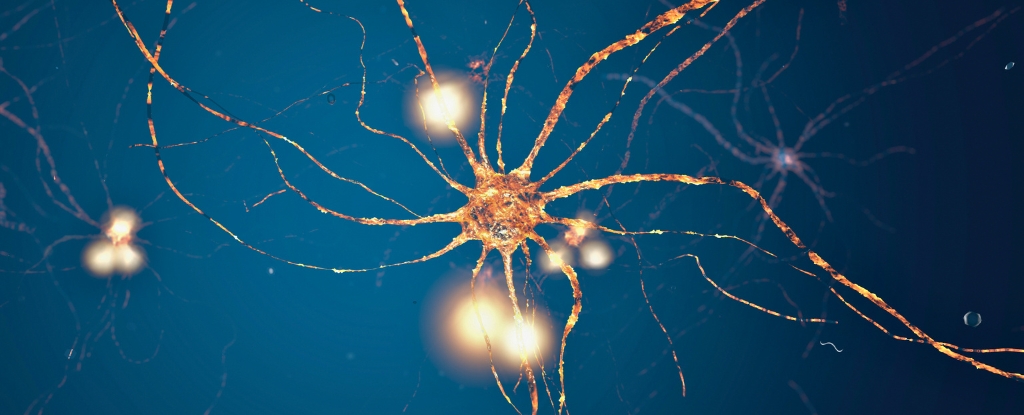


Anorexia nervosa is a gut-wrenching eating disorder that may be linked to the ‘blunted’ release of a particular chemical in the brain, an animal study suggests.
Male mice engineered to harbor a rare genetic variant found in some people with eating disorders (and substance use disorders too) were found to be deficient in a neurotransmitter, called acetylcholine, in a part of the brain, the striatum, involved in learned behaviors, cravings, and reward.
Although further validation and human studies are required, the work “identifies a mechanism and a potential treatment to alleviate these severe psychiatric disorders,” Mathieu Favier, a neuroscientist at McGill University in Montreal, and colleagues write in their published paper.
In short, restoring acetylcholine levels – using a drug already approved for Alzheimer’s disease – might help, but other kinds of therapies are probably still required.
Favier and colleagues started by confirming the link between the aforementioned genetic mutation and substance use disorders in a new cohort of patients that also included some with eating disorders. The p.T8I variant of the SLC17A8 gene is rare, found in only 9 of 793 cases in this study – so bear in mind the results may not apply to everyone with these disorders.
What these two disorders share are habits that are hard to break, and compulsive behaviors driven by restriction, in the case of eating disorders, and ‘rewards’, in the sense that addictive drugs activate the brain’s reward system, delivering a kick of dopamine and other reward compounds in the brain.
Treating the genetically engineered mice with donepezil, an Alzheimer’s drug that inhibits the enzyme that breaks down acetylcholine, had some noticeable effects: The animals began eating normally and fewer dropped weight after previously showing behaviors reminiscent of binge eating and restrictive eating.
“We found that it fully reversed the anorexia-like behavior in mice, and we believe that it could potentially offer the first mechanism-based treatment of anorexia nervosa,” says McGill University neuroscientist Salah El Mestikawy, senior author of the study.
“In fact, we are already seeing its effects on some patients with the disease.”
Ten patients have been treated with low doses of donepezil in a Canadian pilot study. Randomized controlled trials, testing if that treatment is any better than a placebo at alleviating anorexia nervosa, are planned.
It’s handy when existing drugs can be repurposed like this to possibly treat other conditions. But until those trials are completed, we won’t know how well the findings of this animal study translate into humans, and if restoring acetylcholine levels is an effective treatment strategy.
The study involved male mice when eating disorders mostly affect women so there may be some sex-based differences unaccounted for there. Donepezil also has some known and serious side effects, hence the clinical trials will test only low doses of the drug.
The results do, however, offer some cautious hope that a medication may be on the horizon to help with treating anorexia, an illness that carries one of the highest mortality rates among severe psychiatric disorders.
As with many mental illnesses, research is seemingly a tug of war between the biological factors underpinning conditions such as anorexia, or mood disorders such as depression, and the psychological aspects of each illness.
In 2019, scientists identified eight genetic markers associated with anorexia after analyzing DNA samples from almost 17,000 patients with anorexia nervosa and some 55,000 people without. Some of these genetic variants relate to the way people metabolize fats and sugars.
Finding those biological underpinnings can help reduce the stigma associated with mental health conditions. Showing they have a physiological basis helps make it clear that people may have a genetic or biological predisposition to developing a particular disorder.
However, there is always added complexity with social, psychological, and environmental factors – that people may or may not have control over – acting on those biological foundations.
Getting to grips with the intersecting contributing factors of mental health conditions has repercussions for treatment. For example, a chemical imbalance in serotonin, long thought to be the cause of depression, has driven the use of antidepressants that don’t work for many people and now research suggests that theory might be somewhat off the mark.
In the case of anorexia, using acetylcholine inhibitors to treat this and other obsessive-compulsive disorders may be controversial, as Favier and colleagues themselves note, and no medication is a fix-all.
So the current standard of care, behavioral therapies, will still be part of the repertoire to help patients, even as new treatment modalities are explored.
The study has been published in Nature Communications.